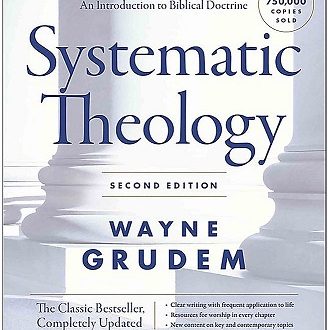Last week, Pete Enns interviewed Jen Hatmaker about her recent exit from evangelical Christianity. You can download the interview here or listen below:
–
The interview focuses on Hatmaker’s decision to embrace homosexual immorality as consistent with following Jesus. Among other things, Hatmaker describes all the consequences that have resulted from that decision—lost book contracts, cancelled speaking engagements, estranged friends and church members. She describes a harrowing emotional cost for her decision to walk away from the 2,000-year old teaching of the Christian church.
I have previously heard her talk about a lot of this, but one item in particular stuck out to me this time. One of the interviewers asked her if she had an “Aha!” moment in her reading of scripture that led her to her new views. Hatmaker explains that since key biblical texts about sexuality are disputed and unclear, she applies a hermeneutical rule to help her sort through competing interpretations. At the 29:31 mark:
It was actually Jesus’ teaching on fruit that locked us in hard. When you know basically Jesus is like, “Okay well, some things are hard to understand. Some things are confusing. People are confusing. There’s conflict. So when you’re not sure, when there something… that feels ambiguous, or it feels contentious, or there’s tension around its interpretation, look to the fruit.” Like, the fruit is going to tell you the truth. Because ultimately, how ever you slice it, a good tree is gonna bear good fruit. And a bad tree is going to bear bad fruit. There’s a clue. That’s a clue that I feel like Jesus put into the hands of future believers as we were gonna do our generation’s work of pressing on scripture, finding the threads of truth, and how do we interpret it and apply it to our lives at this time.
And so it was the fruit that I couldn’t sleep over. When I looked to the fruit of the non-affirming Christian tree, the fruit was so universally bad. It was suicide. It was broken families. It was folks kicked out of their churches. It was homeless teenagers. It was self-hatred and self-harm and depression, crushing loneliness, separation from God (self-imposed)… If we are being honest, the fruit of the tree is rotten.
Hatmaker’s reasoning here is not original to her. Matthew Vines popularized this novel reading of Jesus’ teaching about “fruit” in his book God and the Gay Christian. Vines uses Jesus teaching about fruit in Matthew 7:15-16 as a hermeneutical key to suppress biblical texts that clearly condemn homosexual desire and behavior (e.g., Rom. 1:26-27; 1 Cor. 6:9-11; 1 Tim. 1:10). Because opposing homosexuality harms homosexuals (a bad fruit), the traditional texts must be reinterpreted in a way that is no longer harmful to gay people. And now Hatmaker is apparently following his lead.
There are a number of serious problems with this interpretation, not the least of which is the fact that it constitutes a complete misunderstanding of Jesus’ teaching about fruit. Matthew 7:15-16 is a text warning about false teachers, “You will know them by their fruits.” The “fruit” metaphor appears a number of times in Matthew’s gospel. Contrary to Vines, it does not signify bad outcomes generically. In the metaphor, fruit grows from a root. If a root is evil, then so will its fruit be evil. Conversely, evil fruit always comes from an evil root. In Matthew 3:8, “fruit” symbolizes behavior that comes from a repentant heart. In Matthew 12:33, “fruit” stands for blasphemous words which flow from an “evil” heart. In Matthew 13:8, 23, it signifies “a lifestyle which responds to the preaching of the word.”1
Here’s the key point to observe. The good or bad quality of the fruit is determined solely by its conformity to God’s revelation in Christ, not by any particular sinner’s subjective impression of it. Hatmaker’s misuse of Matthew 7:15-16 would create ethical anarchy if applied consistently. For example, it may cause someone personal distress and psychological “harm” to tell them that stealing is wrong. That distress would be a “bad fruit” on Hatmaker’s definition, yet I doubt Hatmaker would justify stealing in order to avoid “bad fruit.” This is no way to construct an ethical theory, and it is not a faithful application of Jesus’ words in Matthew.
Not only is Hatmaker’s approach a gross misinterpretation of Jesus’ words in Matthew 7, it is also an uncritical use of an ethical theory called consequentialism. Consequentialism bases moral judgments on the consequences that accrue to human actions. No human action is inherently good or evil in this theory, only its consequences. Thus one must not pronounce judgment on human actions, only on the consequences that flow from those actions. The problem with this theory is that it elevates our evaluation of consequences above Scripture as the standard for evaluating what is right and wrong. Also, consequentialism provides no objective definition of what defines a good or a bad consequence. A good consequence for one person may be a bad consequence for another.2
Nevertheless, this is exactly how Hatmaker approaches the issue of homosexuality vis a vis Matthew 7:15-16. She alleges a variety of negative consequences that flow from calling homosexuality a sin. We must, therefore, modify/reinterpret the Bible so that people no longer feel badly about the Bible’s sexual ethic. On this basis, Hatmaker would sweep away the entire 2,000-year old consensus of the Christian church. The church’s understanding of scripture causes some people to feel badly, so it must be done away with. I agree with Richard Hays’ comments on this approach to ethical reasoning: “How strikingly indifferent is the New Testament… to consequentialist ethical reasoning. The New Testament teaches us to approach ethical issues not by asking ‘What will happen if I do x?’ but rather by asking ‘What is the will of God?'” 3
Matthew 7:15-16 does have a warning for us, but not the one that Hatmaker alleges. It warns us to watch out for wolves in sheep’s clothing. In this instance, Hatmaker is concealing the wolf of consequentialism in the clothing of Matthew 7. In doing so, she manipulates readers so that they feel they are doing the right thing when they suppress the message of key biblical texts. Readers would do well not to be taken in by the ruse.
Jesus says that his commands are not burdensome (Matt. 11:28-30), but Hatmaker says that they are not only burdensome but also harmful to people. Who is right? Hatmaker or Jesus? Unfortunately, the answer to that question is unclear to many. But it won’t prove unclear to genuine followers of Christ. I hope and pray that it will one day be clear again to Hatmaker as well.
—————
1 R. T. France, The Gospel of Matthew, NICNT (Grand Rapids: Eerdmans, 2007), 291.
2 Denny Burk, What Is the Meaning of Sex? (Wheaton, IL: Crossway, 2013), 27-28.
3 Richard B. Hays, The Moral Vision of the New Testament: Community, Cross, New Creation, A Contemporary Introduction to New Testament Ethics (New York: HarperOne, 1996), 455.



